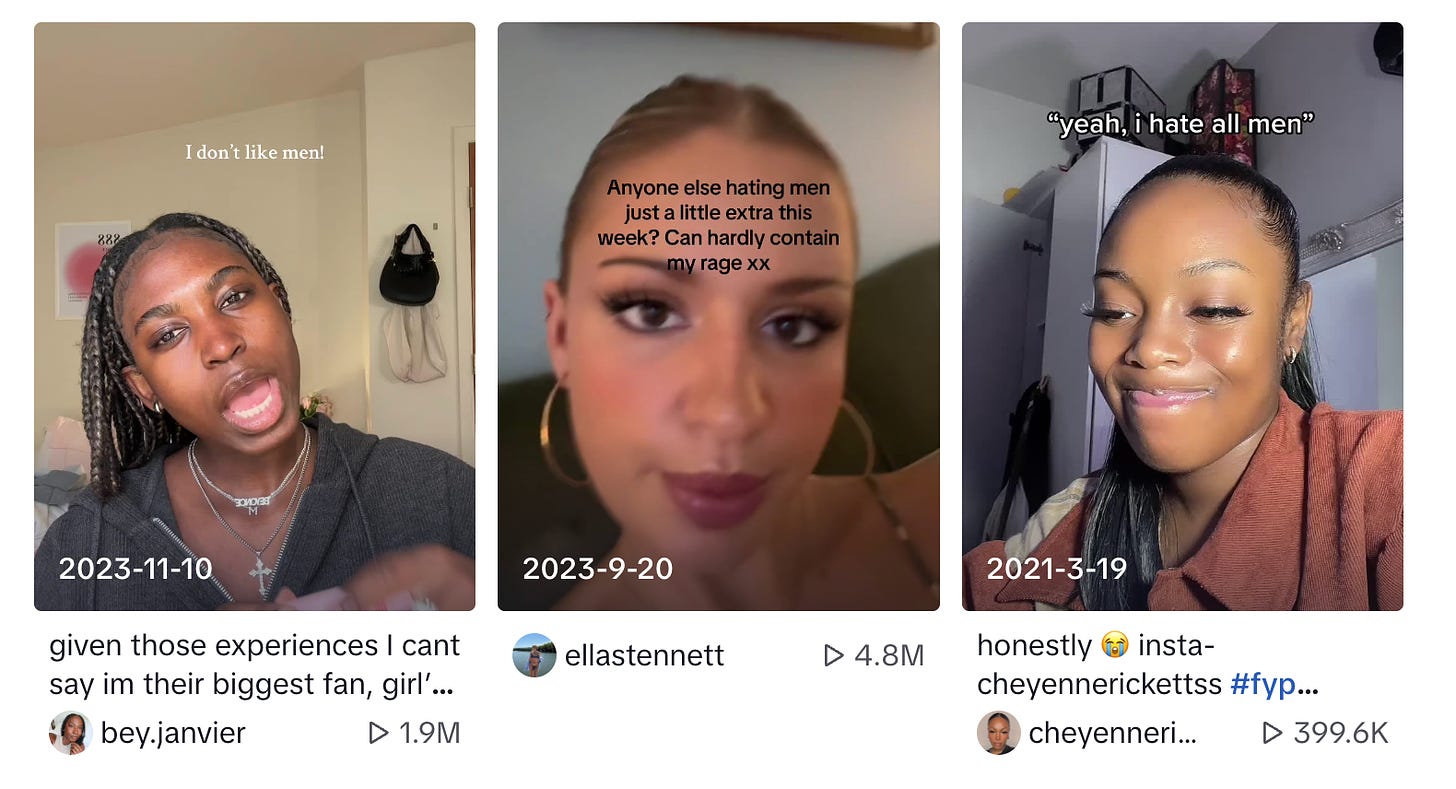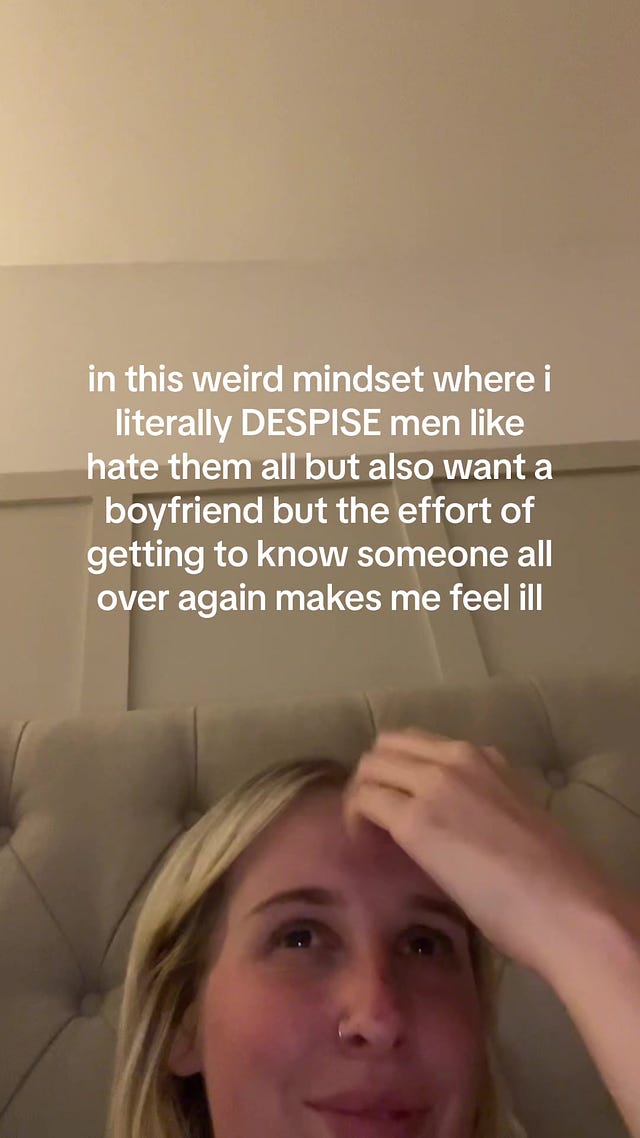Do Women Even Like Men Anymore?
Our culture of casual man-hating probably isn't making us happier.
This essay is a continuation of last week’s newsletter “Do Men Even Like Women Anymore?” I recommend reading that first, if you haven’t already. I also intend on writing a third and final part.
When I say that an increasing niche of straight men no longer seem to like women enough to even desire them sexually, my goal is not to convince these men that they’re wrong for feeling how they do. My goal instead is to highlight it as a problem, one that we as a collective should be invested in addressing even as unpopular a demographic this may be. Part of this whole equation — both why these men no longer like women, and the problem of getting anyone to care — is the fact that many women also do not at all.
Women no longer liking men actually strikes me as a far more mainstream occurrence. The trend of women pursuing celibacy, for example, is never branded as a radical pursuit but rather a natural consequence of our current cultural dynamics. “Of course women don’t want to sleep with these guys,” the many articles on the subject say, “why would they when men are this bad?”
 Tiktok failed to load.
Tiktok failed to load.Enable 3rd party cookies or use another browser
A woman repeating something along the lines of “When you get over your attraction to men, you realize how boring they are” (the inverse of some of the posts I featured in the previous essay) would be uncontroversial. Women thinking men are useless or dumb or rude or a chore to be around are basic fixtures of conversation. The basic premise of this essay, the question of whether women even like men anymore, is barely worth asking. The answer is obvious: of course not.
This is, of course, a contributing factor in the decline of straight men liking women that I previously discussed. With so many of us explicit in our disdain for men, why would they even bother? But before we can explore how this has come to be, there are some hard truths that must be acknowledged. As women, we are far more likely to experience sexual violence and abuse at the hands of men than the other way around. For much of history, women broadly liking men was itself irrelevant. It didn’t matter if we did — we were expected to put up with it, regardless. That women even have the choice to answer this question for themselves is a relatively new phenomenon. Misandry and misogyny are simply not equal in the quantity of harm they cause. It does not mean one is inherently worse than the other in a vacuum, but we do not exist in a vacuum. We exist in a time where intimate partner violence is the leading cause of death of pregnant women.
With all that said, I do think we should discuss that there is something else happening here. The sort of casual misandry that pervades social media is not just due to all of us suddenly becoming more aware of the problem of misogyny. To be clear, I am again not arguing that casual misandry and violent misogyny are in any way equal. They’re not. Still, this blasé man-hating and what it signals for our culture is worth interrogating. It isn’t doing us any good. We are not any safer as women because of it. We are not further liberated by it.
Women do not like men in part because of these realities. They also, however, do not like men because we have promoted a culture in which this is normalized. It’s become deeply uncool as women to acknowledge any sort of affinity or appreciation for men. To do so runs the risk of being a “pick-me” or “not a girl’s girl” — two of the greatest sins a girl can commit. In order to be pro-women, one must now be vocally anti-men. Conversely, to be pro-men in any way has become synonymous with being anti-women. It’s as though we’re not allowed to like each other anymore.
Like with men opting out of their desire for women, this current trend of young women opting out of sex and dating is partially motivated by the ease of resignation. It’s challenging today for women to ascertain what we want, or what it is we’re supposed to want. Do we want to be Ms. Independent? Do we want a man to provide? Do we want to be sexually appealing? Do we want guys at the bar to be too intimidated to approach?
When we do like men, it’s often through the filter of ultra-specific portraits we’ve imagined ourselves to want: the myth of the 6’5 man in finance with blue eyes and a trust fund. Many of us, I think, haven’t the slightest clue what we’re really looking for, and instead allow social pressures and trends to dictate them for us. Rather than dig too far into our own desires, we allow ourselves to be prescribed them and be further disappointed when they go unfulfilled. All of these narratives are presented to us at once, and in trying to balance them, we find ourselves dissatisfied at every turn. It is understandable that we’d be frustrated and polarized by this. But in relinquishing ourselves toward this constant antagonism, we aren’t doing ourselves any favors. It does not ultimately afford us any empowerment or improvement: it just leaves us bitter and upset.
 Tiktok failed to load.
Tiktok failed to load.Enable 3rd party cookies or use another browser
Unlike the Manosphere, this world of women who dislike men isn’t propped up by many notable female figures whose claim to fame is touting some sort of pro-women ideology. I instead get the sense that it is propped up largely by everyday people, run-of-the-mill girls who see themselves as part of the norm. Many of them have developed their sentiments through lived experience: by having bad encounters with men, being treated poorly on dates, receiving threatening behavior online, et cetera. But a good portion of us are likely experiencing this through osmosis on social media: whereas young men are being algorithmically lured toward guys like Andrew Tate on X and YouTube, young women are being embittered toward men by dating creators on TikTok, by magazine articles, by a broader culture that has encouraged this disdain and made it profitable. Nobody goes viral for talking about a good date they went on.
A lot of us are probably just making jokes and venting our frustrations. That’s fine! That’s healthy! But I fear some of us are so wrapped up in this hostility that we’re making ourselves miserable. The gender war wants us to hate each other. As women, we should be questioning whether our casual distaste for men actually benefits us, whether it makes us happy, and where these beliefs are coming from. I’m not telling anyone to settle. I’m not telling anyone to deny their own emotions or experiences. I am suggesting instead that we question this culture of resentment and whether we’re letting Internet trends dictate the course of our lives.
We are supposed to like each other. We are supposed to want to be with each other, to understand our differences, to balance each other’s strengths. We are supposed to want to have sex, to deal with annoying habits, to settle in the mundane, to share new experiences. Even if temporarily, even if for but a night, we are supposed to want to partner up. And yet we have entered an era in which both parties have either aggressively quit on this premise or quietly abandoned the prospect. The only thing it seems we know how to do now is blame the other for it.








Is it a good thing that men and women seem to hate each other? No. But, to be blunt, it seems like the inevitable consequence in a patriarchal world that has oppressed women for centuries. I mean, this is the first generation where women have not faced massive economic and social backlash for decentering men and expressing their rage. Are we really surprised at women's reaction? Really? *Especially* considering the fall of Roe v Wade in the US? Women not liking men results in the girlies complaining online in sometimes angry, sometimes funny Tiktoks. Men not liking women results in a spike of men beating their pregnant girlfriends to death. What gender war? There is a war on women and femme-presenting people, but there is no war on men. There is female oppression and the very rational reaction to it.
"We are supposed to like each other." Yes, of course. But I don't expect any woman to apologize, to tone it down, or to swallow her anger at the boot on her neck. Remove the boot, and the culture will change.
Thank you for stating the obvious. What's most frustrating about this to me is that a man even gesturing to this dynamic among women online (read: most "normie" spaces on the internet/social media) usually results in severe backlash. You can't acknowledge the reductive statements as reductive, the contempt as contempt, or the double standards as double standards without being thoroughly excoriated for daring to criticize the behavior of women.